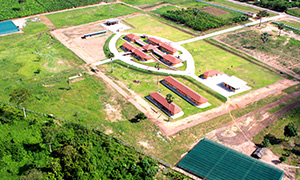Nestlé, the world’s largest food company, has developed a $4 million USD coffee and cocoa farm and training center on 30 hectares (74 acres) in Ivory Coast.
The company says the farm provide 27 million coffee plants by 2020 to help rebuild the West African country’s coffee segment. Ivory Coast was for years the world’s third largest coffee producer in the world in the 1970s, but crumbling infrastructure and, more recently, civil war, have greatly affected production. According to the latest International Coffee Organization, Ivory Coast produced just under 1 million bags this past crop year, compared to more than 6 million during the 1999-2000 season.
(more: Fifteen Ivory Coast Coffee and Cocoa Regulators Sentenced to Prison)
The new farm is in the village of Zambakro, approximately 18 kilometers from the capitol, Yamoussoukro. Nestlé says the farm will immediately create 20 jobs. The farm will also provide a testing ground for other agricultural products, including cocoa (Ivory Coast remains the world’s top producer), cereals including millet, sorghum and maize, and and root crops, like cassava and yams.
“Our research will help improve the nutritional value and yield of our raw materials, to address nutritional needs around the world,” Johannes Baensch, Nestlé’s Head of Research and Development, said in the opening ceremony.
Some of the farm’s focus will be on sustainability and agricultural education, including what Nestlé is calling “a mini propagation laboratory, where high-yielding plantlets for distribution to cocoa and coffee farmers will be grown. It will also host a breeding programme for new varieties of coffee and a soil fertility lab.”
Nick Brown
Nick Brown is the editor of Daily Coffee News by Roast Magazine.
Comment
2 Comments
Comments are closed.







I suppose I should really be happy about this – after all, it’s a pretty serious investment into the coffee industry – but the coffee snob inside me just can’t get on board with mass growth and production on scale like this.
Regardless though, it’s great news for the local community, so good on Nestle for that at least.
I can’t help but feel there’s more in this for Nestle than there is for the West Aftican Coffee industry…
Still, it’s a positive step. Prove us all wrong Nestle, I dare you.